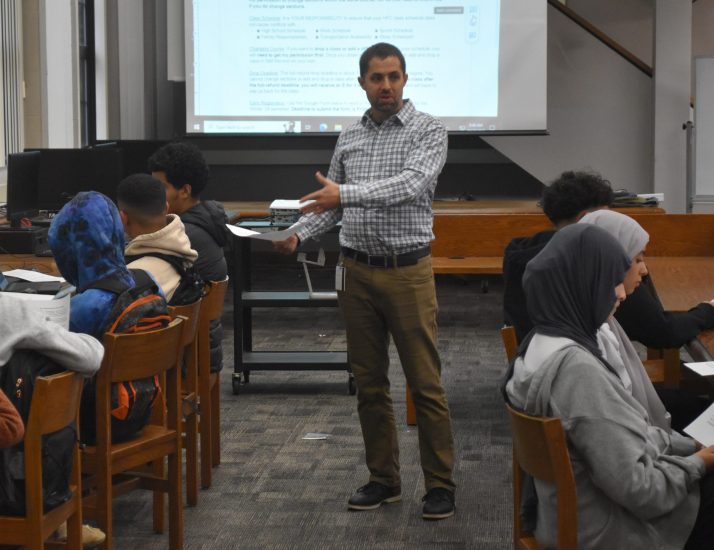Michael Gothro sits in a corner of the high school library talking to another teen about high school, college and their plans for life after both.
Mr. Gothro is the counselor for the Henry Ford Collegiate Academy. The program, a partnership between Dearborn Public Schools and Henry Ford College (HFC), allows students to attend a mix of traditional high school and college for five years at no cost to the student or family.
“I don’t know why anyone wouldn’t do this program. It’s two free years of college,” Gothro says.
The Collegiate Academy is one of two types of what are called early middle colleges offered in Dearborn Public Schools. The other program – Henry Ford Early College – now has three branches, one for health care careers, one for advanced manufacturing and another for educators. All of those students attend a separate high school on the HFC campus. Seats are limited for each of the three programs, and typically a lottery is held to select which students are accepted.
The Collegiate Academy is the only one of its kind in the entire state because of how it blends regular high school with the early middle college.
Dearborn Public School students start at their traditional high school – Fordson, Edsel Ford or Dearborn High – and can continue at that school for four years. At the end of sophomore year, every student who qualifies is invited to join the Collegiate Academy. Any student who accepts the invitation is admitted. As of the fall 2023, 305 district students are in the Collegiate Academy.
The students will continue taking a mix of college and high school classes through their senior, or 12th grade year, and then take only college classes in grade 13. The Collegiate Academy is designed so students can still have all the traditional high school experiences including playing sports, participating in a larger variety of clubs, attending dances and more.
To be invited students must be on track to graduate, meaning they are not missing any graduation requirements from 9th and 10th grade.
After that, there are three ways students can earn an invitation: pass the PSAT test in ninth grade, pass the PSAT test in 10th grade, or have a 3.5 or higher grade point average by the end of their third semester of high school (first semester of sophomore year).
If they accept their invitation to the program, students will start junior year with a College 101 course. This class is required by the state for any student in an early middle college program, Mr. Gothro said. It teaches students tools for success like study habits, staying organized and more. By the second semester of 11th grade, students will be taking two college courses and the rest of their classes at their home high school.
Students and parents often think of the Collegiate Academy as a way to earn a free associate degree or trade certification, and students certainly have those as options. But most students use the Academy to pack in credits for college, which will save them time and money as they pursue a bachelor’s degree, Gothro said.
The Michigan Transfer Agreement (MTA) is a certification many Academy students receive at the end of the program, which fulfills the general education requirements for any bachelor’s degree. Most universities in Michigan participate with the MTA. On top of that, Academy students transfer many required college credits for their specific career path to universities like Wayne State, University of Michigan-Dearborn, University of Michigan-Ann Arbor, and Michigan State.
“We just want students to get as many required bachelor’s degree courses as they can get,” Gothro said.
If students know what bachelor’s degree they want to earn, then Gothro can steer them to more specific courses that fit their needs.
“If they don’t have an idea, then for sure we have them get the MTA done,” he said.
He added later, “I’m helping them make career choices. Every time I meet with them I’m asking what are your career goals and what is realistic.”
Some students might insist they want to be a doctor. But then they really struggle with an intro science class and may decide, like thousands of other college students each year, that they want to change their focus.
“None of it is wasted time,” Gothro said. It is better for students to realize earlier and before they are paying for classes, that a certain major or career path is not for them.
For the second semester of 11th grade, students generally take two MTA classes. College courses have to be carefully selected because students also still need to meet the Michigan high school graduation requirements for math, English, science, and other criteria. For example, most juniors will take a college political science class because the course can count as both a high school government credit and transfer credit.
“In 12th grade, I tell our students to consider themselves as freshman in college,” Gothro said.
Students will take only one class at their home high school, and three or four each semester at Henry Ford College. For the 13th year, all of the student’s classes will be at the college, although technically they are still considered high school students.
What college classes those are will depend on the student, their interests and future goals.
“Everything is totally individual based in the program,” Gothro said.
Another nice feature of the Academy is that while students may head off to the university with a year or two worth of college credit, they are still treated as first-time college students. That makes them eligible for more scholarships and financial aid.
As a community college, Henry Ford College has paths for just about any career or college degree a student may be interested in. That makes it ideal for high school students in the Collegiate Academy.
“No matter what career you want to go into, you can get started at HFC through the Collegiate Academy,” Gothro said.

